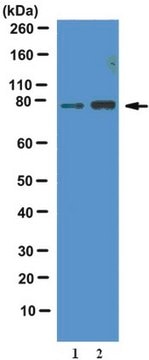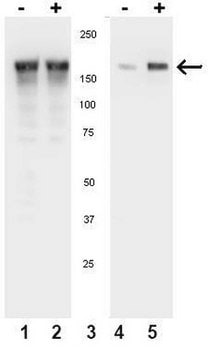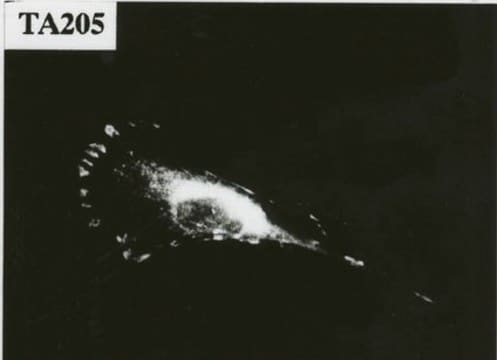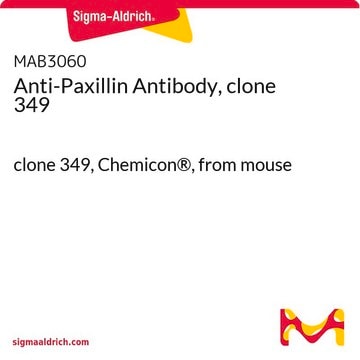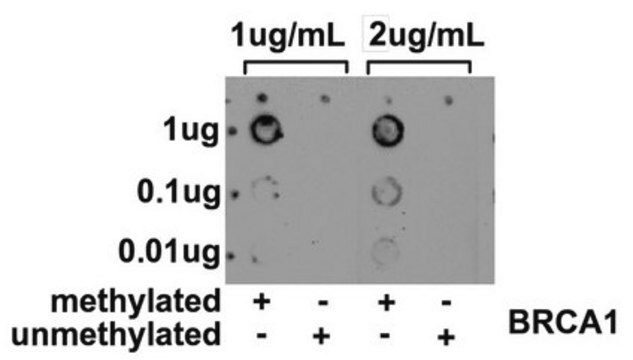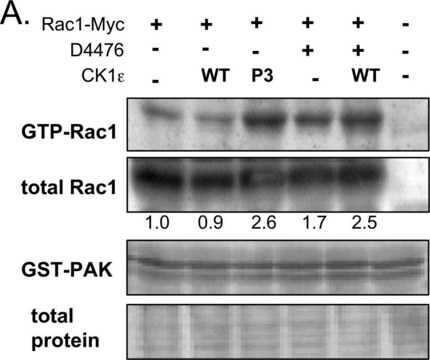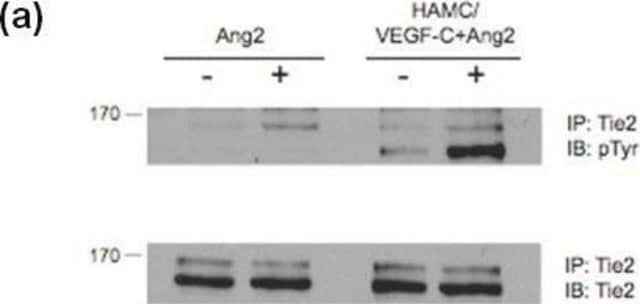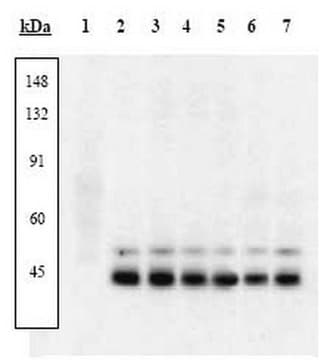16-104
Anti-Phosphotyrosine Antibody, clone 4G10®, FITC conjugate
clone 4G10®, Upstate®, from mouse
Sign Into View Organizational & Contract Pricing
All Photos(1)
About This Item
UNSPSC Code:
12352203
eCl@ss:
32160702
NACRES:
NA.41
Recommended Products
biological source
mouse
Quality Level
conjugate
FITC conjugate
antibody product type
primary antibodies
clone
4G10®, monoclonal
species reactivity (predicted by homology)
all
manufacturer/tradename
Upstate®
technique(s)
immunocytochemistry: suitable
shipped in
wet ice
target post-translational modification
phosphorylation (pTyr)
Gene Information
human ... PID1(55022)
Related Categories
General description
Anti-phosphotyrosine antibody (05-321), cross-linked to fluorescein isothiocyanate (FITC).
Specificity
Recognizes tyrosine-phosphorylated proteins from all species.
Immunogen
Phosphotyramine-KLH.
Application
Detect Phosphotyrosine using this Anti-Phosphotyrosine Antibody, clone 4G10, FITC conjugate validated for use in IC.
For use in applications in which a FITC conjugate is advantageous, such as ICC.
Research Category
Signaling
Signaling
Research Sub Category
General Post-translation Modification
General Post-translation Modification
Quality
routinely evaluated in immunocytochemistry to detect tyrosine phosphorylated proteins in EGF-stimulated human A431 cells
Physical form
PBS containing 0.05% sodium azide
Protein G Purified
Storage and Stability
Stable for 9 months at 4°C
Analysis Note
Control
Pervanadate-treated human A431 cell extracts or EGF-treated human A431 cells
Pervanadate-treated human A431 cell extracts or EGF-treated human A431 cells
Legal Information
4G10 is a registered trademark of Upstate Group, Inc.
UPSTATE is a registered trademark of Merck KGaA, Darmstadt, Germany
Disclaimer
Unless otherwise stated in our catalog or other company documentation accompanying the product(s), our products are intended for research use only and are not to be used for any other purpose, which includes but is not limited to, unauthorized commercial uses, in vitro diagnostic uses, ex vivo or in vivo therapeutic uses or any type of consumption or application to humans or animals.
Not finding the right product?
Try our Product Selector Tool.
Storage Class Code
12 - Non Combustible Liquids
WGK
WGK 2
Flash Point(F)
Not applicable
Flash Point(C)
Not applicable
Certificates of Analysis (COA)
Search for Certificates of Analysis (COA) by entering the products Lot/Batch Number. Lot and Batch Numbers can be found on a product’s label following the words ‘Lot’ or ‘Batch’.
Already Own This Product?
Find documentation for the products that you have recently purchased in the Document Library.
Xiaomin Zhang et al.
Neuron, 107(6), 1212-1225 (2020-08-09)
Dentate gyrus granule cells (GCs) connect the entorhinal cortex to the hippocampal CA3 region, but how they process spatial information remains enigmatic. To examine the role of GCs in spatial coding, we measured excitatory postsynaptic potentials (EPSPs) and action potentials
Marina Guillén-Yunta et al.
Fluids and barriers of the CNS, 20(1), 79-79 (2023-11-04)
The monocarboxylate transporter 8 (MCT8) plays a vital role in maintaining brain thyroid hormone homeostasis. This transmembrane transporter is expressed at the brain barriers, as the blood-brain barrier (BBB), and in neural cells, being the sole known thyroid hormone-specific transporter
Experimental inoculation of juvenile rhesus macaques with primate enteric caliciviruses.
Sestak, K; Feely, S; Fey, B; Dufour, J; Hargitt, E; Alvarez, X; Pahar, B; Gregoricus et al.
Testing null
José Ursic-Bedoya et al.
Molecular metabolism, 60, 101483-101483 (2022-04-04)
Fibroblast growth factor 19 (FGF19) is a hormone with pleiotropic metabolic functions, leading to ongoing development of analogues for treatment of metabolic disorders. On the other hand, FGF19 is overexpressed in a sub-group of hepatocellular carcinoma (HCC) patients and has
B Josh Lane et al.
PLoS pathogens, 4(3), e1000014-e1000014 (2008-04-04)
Chlamydia trachomatis attachment to cells induces the secretion of the elementary body-associated protein TARP (Translocated Actin Recruiting Protein). TARP crosses the plasma membrane where it is immediately phosphorylated at tyrosine residues by unknown host kinases. The Rac GTPase is also
Our team of scientists has experience in all areas of research including Life Science, Material Science, Chemical Synthesis, Chromatography, Analytical and many others.
Contact Technical Service